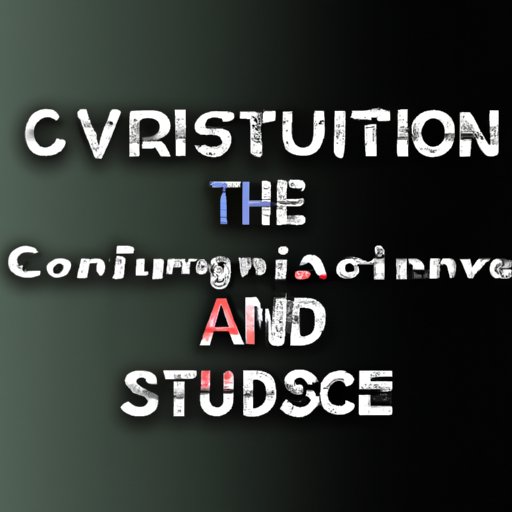Introduction
The term “Culture Wars” refers to the ongoing conflicts between different social and cultural groups in the United States. These conflicts are characterized by intense debates over social issues such as religion, race, gender, and politics. The culture wars have had a major impact on American society, leading to deep divisions and political polarization. In this article, we will explore the history of the culture wars, analyze their impact on society, and examine the role of technology in perpetuating these divisions.
Historical Analysis of the Culture Wars
The culture wars began in the late 20th century as a reaction to the liberal reforms of the 1960s and 70s. During this period, the United States was experiencing rapid social change, as civil rights laws, women’s rights movements, and other progressive causes gained traction. This period of liberal reform led to a backlash from conservative groups, who felt that their traditional values were being threatened by these changes. As the political climate became more polarized, the culture wars emerged as a way for conservatives to express their discontent with the changing social landscape.
The culture wars reached their peak during the 1990s and early 2000s, as conservative forces sought to roll back many of the liberal reforms of the previous decades. Key events in the development of the culture wars included the rise of the Christian right, the passage of the Defense of Marriage Act, and the battle over school prayer. These events highlighted the deep divisions between conservative and liberal forces, and showed just how far the culture wars had come.

Impact of the Culture Wars on Society
The culture wars have had a profound effect on American society. The most obvious impact has been the deepening of social and cultural divisions. In recent years, there has been a sharp increase in the number of Americans who identify as either conservative or liberal, and these divisions have become increasingly entrenched. This polarization has made it difficult to find common ground between opposing groups, leading to further animosity and acrimony.
The culture wars have also had a significant impact on American politics. In recent years, political parties have become more ideologically divided, with Republicans and Democrats staking out increasingly extreme positions. This has made it harder for politicians to reach bipartisan compromises, and has contributed to gridlock in Washington. Furthermore, the culture wars have made it more difficult for candidates to appeal to a broad base of voters, leading to a further polarization of the electorate.

Exploring the Divisions in the Culture Wars
At the heart of the culture wars are deep divisions over a variety of social issues. Religion is one of the most contentious areas, as conservatives and liberals clash over issues such as abortion and gay marriage. Race is another area of contention, as debates rage over immigration, affirmative action, and police brutality. Finally, gender is a major source of disagreement, as feminists and traditionalists battle over issues such as reproductive rights and gender roles.

Analyzing the Political Implications of the Culture Wars
The culture wars have had a major impact on American politics. Ideological conflicts between conservatives and liberals have led to a hardening of political positions, making it more difficult for politicians to reach bipartisan compromises. Furthermore, the culture wars have played an important role in the rise of political parties, as both Republicans and Democrats have sought to capitalize on the divisions in the electorate.
Examining the Role of Technology in the Culture Wars
Technology has played an important role in the culture wars. Social media platforms such as Twitter and Facebook have allowed people to share their views with a wider audience, creating echo chambers in which ideological divisions can be reinforced. Additionally, online propaganda has become increasingly sophisticated, allowing political actors to spread misinformation and manipulate public opinion. In short, technology has enabled the culture wars to become even more entrenched, making it harder for opposing sides to find common ground.
Conclusion
In conclusion, the culture wars have had a major impact on American society. From its historical origins to its contemporary implications, the culture wars have created deep divisions within the country, leading to increased political polarization. Additionally, technology has played an important role in perpetuating these divisions, making it harder for opposing sides to reach common ground. As the culture wars continue to shape American society, it is important to understand their implications, and to strive for solutions that bridge the ideological divide.
(Note: Is this article not meeting your expectations? Do you have knowledge or insights to share? Unlock new opportunities and expand your reach by joining our authors team. Click Registration to join us and share your expertise with our readers.)
